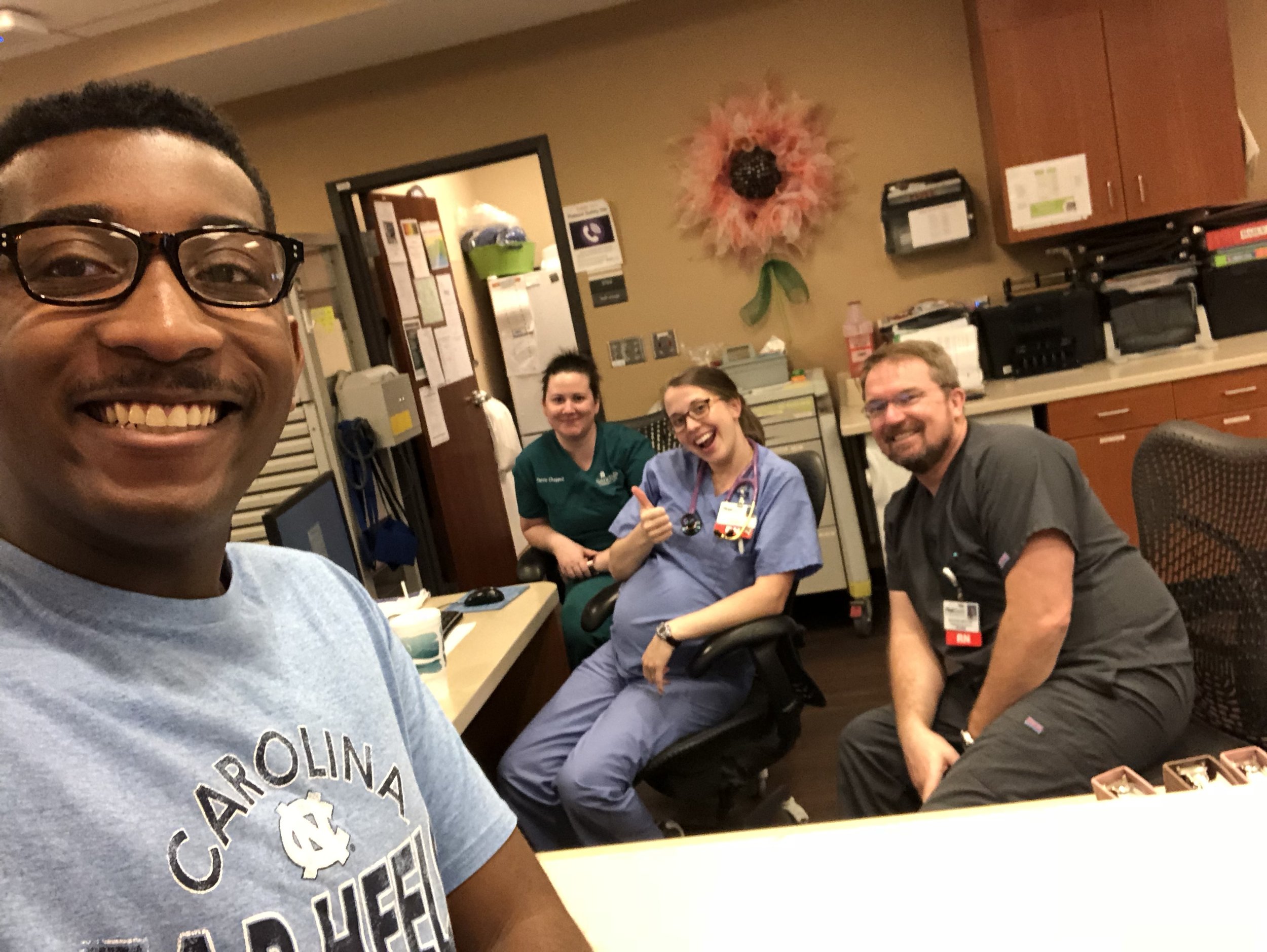Silence is Golden!
Silence is Golden
I took the above picture after having a difficult night at work, working in a surgical unit. In this picture, I had work from 7:00 pm to 4:42 am without sitting for more than 5-7 minutes, without being able to complete any significant charting, without using the bathroom, and without eating or taking more than a couple of sips of water. At this time, all of my patient’s were stable and the floor staff had been great about stepping in to help me. All of my medications, and tasks, outside of 8+ hours of charting, were complete. Thankfully, I did find the time to chart things like vitals and drain and foley outputs, as I collected the information and basic safety rounds charting was mostly done.
I remember thinking “I just need to get away, just for 10 minutes, or I’m going to explode”! I talked with my charge nurse and told her I just needed to step off the floor to get some coffee for a few minutes and gave her a quick status report for my 3 patients. She told me “I’ve got you, you’ve been running all night, take your time”. It felt so good to have that understanding with a coworker. I went to get coffee and sat in the hospital lobby thinking about how much charting I needed to get done and the fact that the early bird Surgical Residents, family members, X-Ray tech, and phlebotomists would be arriving to start back up the ruckus of activity in another hour.
At that moment, I thought “It doesn’t matter. Right now, I am just going to enjoy the fact that there is no one calling me and that I can just sit, breathe and exist in silence for a minute”. I set a 15-minute alarm on my apple watch and just sat with my feet up, drinking my coffee, in the blissfully empty and silent hospital lobby. It was exactly what I needed. After my alarm went off, I went back upstairs to my unit and hustled to pass morning meds and complete charting and I was able to depart for home before 8:15 am, after giving report.
I can honestly say, that in my career, nights like that one are in the minority. That night, like on other similar nights, silence saved me and likely improved the care I provided for the duration of that shift.
Quiet Times in Nursing
Silence is not a common concept in many nursing environments. So often nurses must resist the urge to be silent, in regards to our advocation of our patients and their families. Silence is certainly not a common feature of the practice environment of many bedside or clinical nurses.
There are always phones ringing, call bells chiming, and various pumps and machines alarming in a nurses world. There are the noises of associated with pain, frustration, and delight from staff, patients, and visitors. This constant bombardment with noise can be overwhelming, even on a good day.
Many recognize the importance of silence in the healing process and in the healing environment itself. This silence is needed for optimal patient healing. However, despite the multitude of research and quality improvement articles that highlight the benefit of “Quiet times” for patients, the need for “Quiet time” for nurses and other bedside clinicians is often overlooked.
Here’s the truth. Nursing is a physically, intellectually, and emotionally draining job, even when we find much fulfillment and enjoyment in our job. We, as caretakers, need a moment of respite to recover from the constant bombardment of need that we will inevitably face during our workday.
Now, in a perfect world, patient “Quiet Times” would equate to patients experiencing a time to rest and floor staff experiencing a brief and temporary decrease in general activity, so that things like charting and coffee breaks could take place. However, we don’t live in this ideal world and the reality is that “Quiet Times” can become virtually indistinguishable from any other time period in the healing environment, for both patients and healthcare workers.
There is a school of thought that nurses should be able to find respite and reprieve during their break times, yet there is a trend, across the nation, of nurses not taking their breaks, or having inadequate breaks. Some of the blame for the lack of utilizing break time must be placed on nurses, we often neglect breaks in favor of catching up on tasks or fear of being unavailable to our patients and fellow staff members for an extended period of time.
There are systems where taking a break, although a legally protected concept, is treated like lack of concern on the part of the nurse desiring a break. I’ve personally worked in some systems that cultivate environments where breaks are viewed in such as negative light, seem to indirectly penalize nurses who request or take breaks, particularly breaks longer than 15 minutes.
How can we interrupt this punitive culture around nurses having adequate “Quiet Time”, or breaks, away from the care environment? We must be our own advocates. We must insist upon breaks and exercise our right to take that break outside of the care environment, if we wish, not being satisfied with rapidly eating and charting at the same time. We need time away from the constant outpouring of care, even if it is for only for 15 minutes. Time away from the care environment ( in whatever form your facilities policies allow) is essential for nurses in combating things like compassion fatigue and alarm fatigue.
Here are some tips for getting your “Quiet Time” from my personal nursing experience and the experience of many nurses from the past and present.
Nursing Break Do’s and Don'ts
DO:
Schedule break times early in your shift.
If you work on a unit that doesn’t do this automatically, take the initiative to collaborate with the charge nurse and fellow staff nurses about coordinating times for breaks and nurse coverage of your patient’s during these times.
Be flexible with your break, but don’t just give it up.
There are, inevitably, moments where multiple nurses being on break could be problematic.
If you’re patient has acutely become unstable and there is a need to page a provider or activate an emergency response team, these times are not opportune to go on break, as the primary nurse is needed to provide vital information during these times.
Offer to watch someone else's patients while they go on a break first, and then ask if they will return the favor when they return from break.
If you can’t take a full 30 minutes, ask if someone will allow you to take a couple of 10-minute breaks, enough time to have a cup of coffee and/or use the bathroom.
Specify how long you will be gone. Of course, we are all adults and we don’t have to tell everyone details of what we are doing on our break. However, it is respectful to say something to the effect of “I am taking my 30-minute lunch break” or “I need to step off the floor for 15-minutes” so as to give the person relieving you a timeframe of when to expect you back.
Bring your lunch to work, or come in and get your lunch from your facilities food service area prior to the beginning of your shift. This saves you time and gives you more time to relax. Many facilities don’t provide extra time for walking to get your lunch out of the car or from the cafeteria. Thus, the 10-15mins it may take to retrieve lunch can leave you only 15 minutes to actually consume your food.
Do Not:
Come back from break late. The most disrespectful thing you can do is to develop a habit of returning from your breaks late and inconvenience the charge nurse or fellow staff member who is covering your patients. This won’t gain you any friends.
Take a break early in the shift. A few institutions I’ve worked at had rules that staff working 12-hour shifts could take a 30-minute break within the first 4 hours of the shift and no 15-minute break within the first 2 hours of the shift. Follow your unit and organizational standards and policies for taking breaks.
Go missing from the unit without informing others or the charge nurse that you are leaving, even if it is for a scheduled break or legitimate reason. It is unsafe for your patients and fellow staff members to leave your unit without alerting someone you are gone and how long you’ll be gone, even if it is for a short amount of time.
If all else fails, you can always do the trusty hide in the bathroom and scroll on your phone for a few minutes break, but that’s no fun! Haha!
Happy Nursing!






